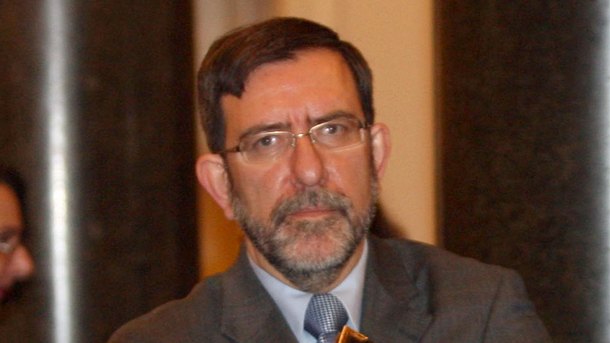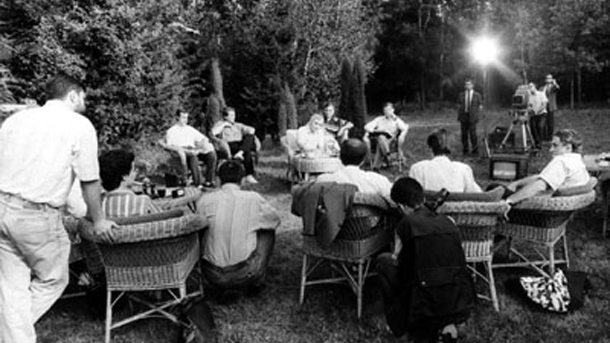“Our task is to turn Bulgaria into a normal country, not a perfect one. Each human being finds it much more natural to live in a world, where the state doesn’t choke him by the throat, doesn’t determine his views or teach him how to leave. The European structures are our guarantees.”
These are the famous words of Philip Dimitrov, said during the roundtable back in 1990. A year and a half later the renowned lawyer headed the first democratically elected government of the Union of Democratic Forces /UDF/.
How did it all happen? The Grand National Assembly worked out and voted the new Constitution. That caused disunity among the parties within the UDF. Besides that there were agents of the State Security infiltrated into all those parties – even the UDF chair Petar Beron was revealed later as one and that exacerbated the conflicts within the union. The selection of a new chair was necessary. The compromise was a person that was not an MP, had no claims and who could be substituted at any time. Fate and the Chair of the Green Party Alexandar Karakachanov pointed at legal expert Philip Dimitrov. Thus the UDF won the 1991 elections on November 4, but couldn’t constitute its own government.
Answering the question of journalist Roumyana Uzunova during the election night on whether the UDF had coalitional intentions, the premier to be gave the line that prompted his future style and turned into an example for public speech in our latest history.
 “It looks like the Movement for Rights and Freedoms will be the third force and it seems that some coalition is necessary.”
“It looks like the Movement for Rights and Freedoms will be the third force and it seems that some coalition is necessary.”
Does the UDF intend to create such a coalition?
“Mrs. Uzunova, I would like to point out that today we can ascertain some things or we can ascertain others. We still don’t know which political forces will participate in the parliament and we have even less knowledge on the stance of the political forces, entering parliament, regarding the participation in the future government, but in any case we will rely on the parliamentary support of the MRF, as we have underlined many times.”
On 8 November 1991 the UDF managed to constitute the first democratic government with the support of the MRF. Economic reforms kicked off and the foreign policy of the country got its Euro-Atlantic orientation on the road towards European integration. On 15 January 1992 Bulgaria was the first to recognize the independence of Macedonia. In August Philip Dimitrov became the first Bulgarian PM to pay an official visit to Israel, which opened the way of bilateral relations – those were all strong initial international steps.
However, the home policy was not that successful. The coalitional partner rejected the idea for opening the files of the former State Security. The transformation of the political power into an economic one was gaining force, while circles from the field of sports, neglected by the state, were busy setting up the first so-called insurance companies – actually engaged in racketeering. The Yugoslavian embargo turned into a favorable environment for the starting of their illegal business activities. At the same time the government had to solve urgently privatization issues and problems, related to the restitution of the properties, nationalized after 9 September 1944. There was strong and organized opposition to all these steps towards market economy and the restoration of justice among the society – both in the parliament and outside of it.
On 4 February 1992 a scandal burst out, known as “That List”. It involved 6 classified documents that were brought into the Turkish embassy by MRF leader Ahmed Dogan. Those contained about 1,300 names of all agents of the Bulgarian intelligence. Dogan was helped by Stoyan Ganev and Zhivko Popov – former Deputy Interior Minister from the totalitarian period, close to the daughter of the dictator Todor Zhivkov – Lyudmila. The handing of the documents was taped by the services. The actions of Dogan were illegal and he had to be sentenced, but the UDF decided to cover the story, being afraid of the possible withdrawing of the MRF support for the government. Dogan was said to be innocent and the whole thing was declared to be a provocation launched by the former State Security services. A few months later Dogan would say his thank you by ordering his party to vote against the confidence vote, requested by Philip Dimitrov.
In 2007 Ahmed Dogan was exposed as agent Sava of the State Security by the Dossier Committee.
 However, there were several other important events that turned 1992 into dreadful for the government. On 30 August 1992 President Zhelyu Zhelev gave a press conference in Boyana Presidential Residence, known as the Boyana Meadows, where he blamed the government for having declared war on all mass media, trade unions, the Bulgarian Orthodox Church and the presidential institution. The cleavage of the parliamentary group was the result of the press conference, as 23 MPs, close to Zhelev left. On September 18 State Security agent Gen. Brigadir Asparuhov, at that time Director of the National Intelligence Service fabricated the affair with the so-called export of arms and appliance that Bulgaria would send to Macedonia as support. There were no proofs at all that the Prime Minister had violated the law, but another provocation mined the Democrats’ rule and accelerated its end.
However, there were several other important events that turned 1992 into dreadful for the government. On 30 August 1992 President Zhelyu Zhelev gave a press conference in Boyana Presidential Residence, known as the Boyana Meadows, where he blamed the government for having declared war on all mass media, trade unions, the Bulgarian Orthodox Church and the presidential institution. The cleavage of the parliamentary group was the result of the press conference, as 23 MPs, close to Zhelev left. On September 18 State Security agent Gen. Brigadir Asparuhov, at that time Director of the National Intelligence Service fabricated the affair with the so-called export of arms and appliance that Bulgaria would send to Macedonia as support. There were no proofs at all that the Prime Minister had violated the law, but another provocation mined the Democrats’ rule and accelerated its end.
Thus, the 28 October 1992 motion of confidence, requested by Philip Dimitrov for moral reasons was predetermined and the government had to resign.
Despite all difficulties the first government of the UDF managed to take the country on the road to market economy that resulted in its NATO and EU membership around 15 years later.
English version: Zhivko Stanchev
Beautiful, smart, talented and a bit exotic, Elisaveta Bagryana is the brightest star on the Bulgarian cultural horizon, one of very few women. Sensitive and frail, she nevertheless proved incredibly resilient in asserting her name,..
The beginning of the 1990’s was a time of faith, hope and love. However, there was a lack of wisdom, Petko Kovachev, who was back then a member of the Independent Students’ Association and Ecoglastnost, said. 1990 was marked by a series of significant..
10 November 1989 began just like any ordinary day, as far as the average Bulgarians were concerned. However, the date got a really different meaning, when at 6:00 pm the BNR was used for the expressing of gratitude to Todor..

+359 2 9336 661
